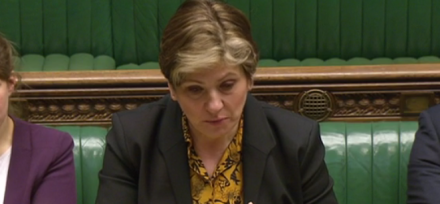
This is the speech given by shadow Defence Secretary Emily Thornberry on the Successor programme at the Royal United Services Institute today.
The question we consider today is whether the government has made a convincing case for the Successor programme? But in many ways, the more fundamental question is why has there been no proper attempt to put forward a case?
Let me put it this way. If this was any other procurement decision, a number of questions would have to be answered in order to make that case:
What is the current operational requirement?
What uses will it have, and what challenges might it face, in the future operational environment?
What is the total cost of bringing it into operation?
Are there more cost-effective alternatives?; and
Always most important, do the benefits outweigh the costs?
To my mind, none of these questions have been fully answered. And if not, how can we determine whether the case has been made?
Let’s look at the money. The latest in a series of rapidly-escalating estimates in the past year puts the cost of manufacturing the submarines alone at up to £41 billion. On the costs of the warhead, maintenance, and associated infrastructure, there is only silence.
When we press the Ministry of Defence, we get the official response: that they need “a safe space away from public gaze” to consider their options “unfettered from public comment” about their affordability. How can we even debate whether the government has made the case for Successor when it is still in its “safe space” considering the options?
But there is another issue on which there is an equally disturbing silence. In the past when major decisions have been made on the future of Britain’s nuclear capability, they have gone hand-in-hand with strong commitments to eventual multilateral nuclear disarmament.
Indeed, Labour’s original decision to renew Trident in 2007 was accompanied by the following statements from then Foreign Secretary, Margaret Beckett: “If we allow our efforts on disarmament to slack…the nuclear shadow that hangs over us will lengthen and it will deepen…so my commitment to the vision of a world free of nuclear weapons is undimmed.”
Go back further to 1957, and the Labour conference in Brighton when Nye Bevan made his impassioned speech on the retention of the deterrent. One line from that speech is best-remembered, but it is worth recalling what preceded it.
Bevan said: “It is not a question of who is in favour of the bomb, but a question of what is the most effective way of getting the damn thing destroyed. It is the most difficult of all problems facing mankind.” That was the basis of his plea that no British foreign secretary should be sent naked into the conference chamber to negotiate disarmament.
Six decades on, what would Bevan make of the fact that the bombs are still with us, now in more countries than ever, but that the conference chamber he talked about lies silent and empty?
And while there are many other equally difficult problems also now facing mankind, like climate change, terrorism, global poverty, and the state of the world economy, huge attention is being paid to each of those, while almost none is being paid to the issue of disarmament.
It was also a Labour government, Harold Wilson’s, that agreed the Nuclear Non-Proliferation Treaty in 1968 “to pursue negotiations in good faith…on a treaty on general and complete disarmament.” The NPT was effectively a bargain between the countries that had nuclear weapons, and pledged to disarm, and the countries that didn’t have weapons, and promised not to develop them.
As an original signatory to the NPT, the UK has a particular obligation to respect the treaty and ensure that others do the same. Margaret Beckett said: “For any generation that would be a noble calling. For ours, it is a duty.”
But under this government, that duty has been deserted. That is why we hear the growing frustration of the majority of the world’s countries with the inertia on nuclear disarmament from countries like our own. We are even being sued by the Marshall Islands in international court for what they see as our failure to keep our word.
So my challenge to the government, and those on the other side of this debate today is this:
Tell us the total costs of Successor?
Tell us how long it will take to deliver?
Tell us what the operational needs and challenges will be in 30 years’ time?
And, as I have said today, tell us how it fits with a strategy for eventual multilateral disarmament in line with the treaties we have signed?
Answer those questions, and then we can start to debate whether you have made your case.




More from LabourList
‘The hope that kills you’: Reflections from the final day in Gorton and Denton
MPs, union leaders and organisations react to ‘bruising’ Gorton and Denton result
A gory night for Labour